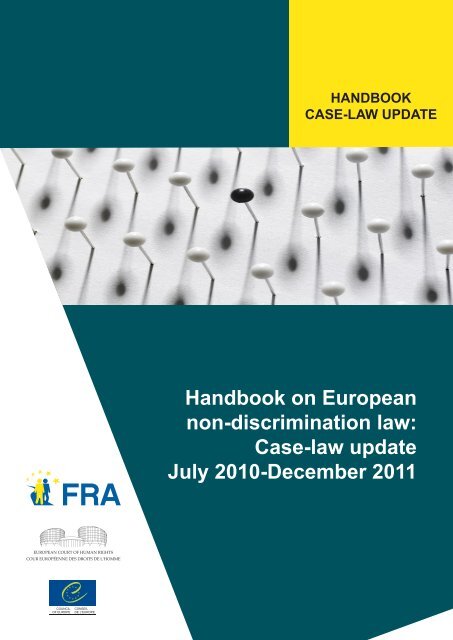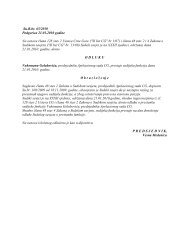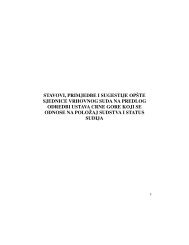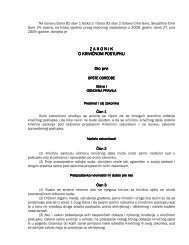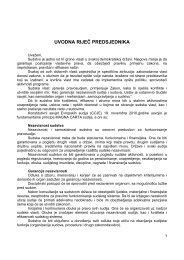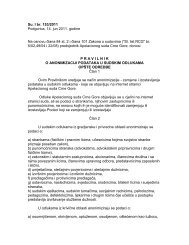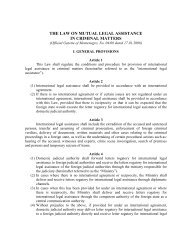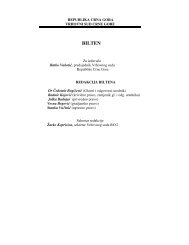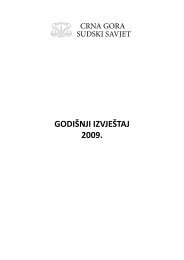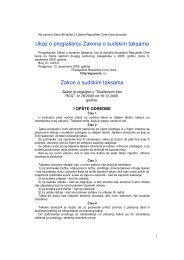Handbook on European non-discrimination law: Case-law update ...
Handbook on European non-discrimination law: Case-law update ...
Handbook on European non-discrimination law: Case-law update ...
Create successful ePaper yourself
Turn your PDF publications into a flip-book with our unique Google optimized e-Paper software.
HANDBOOK<br />
CASE-LAW UPDATE<br />
<str<strong>on</strong>g>Handbook</str<strong>on</strong>g> <strong>on</strong> <strong>European</strong><br />
n<strong>on</strong>-discriminati<strong>on</strong> <strong>law</strong>:<br />
<strong>Case</strong>-<strong>law</strong> <strong>update</strong><br />
July 2010-December 2011<br />
EUROPEAN COURT OF HUMAN RIGHTS<br />
COUR EUROPÉENNE DES DROITS DE L'HOMME
© <strong>European</strong> Uni<strong>on</strong> Agency for Fundamental Rights, 2012<br />
Council of Europe / <strong>European</strong> Court of Human Rights, 2012<br />
Credit (cover): © iStockphoto<br />
Reproducti<strong>on</strong> is authorised, except for commercial purposes, provided the source is<br />
acknowledged.<br />
A great deal of informati<strong>on</strong> <strong>on</strong> the <strong>European</strong> Uni<strong>on</strong> Agency for Fundamental Rights (FRA) is<br />
available <strong>on</strong> the Internet. It can be accessed through the FRA website at .<br />
Further informati<strong>on</strong> <strong>on</strong> the case-<strong>law</strong> of the <strong>European</strong> Court of Human Rights (ECtHR) is<br />
available <strong>on</strong> the Court´s website: . The HUDOC search portal provides access<br />
to judgments and decisi<strong>on</strong>s in English and/or French, translati<strong>on</strong>s into additi<strong>on</strong>al languages,<br />
m<strong>on</strong>thly case-<strong>law</strong> informati<strong>on</strong> notes, press releases and other informati<strong>on</strong> <strong>on</strong> the work of the<br />
Court.<br />
The summaries in this document do not bind the ECtHR.<br />
This <strong>update</strong> is <strong>on</strong>ly a web-document supplementing the printed <str<strong>on</strong>g>Handbook</str<strong>on</strong>g> <strong>on</strong> <strong>European</strong> n<strong>on</strong>discriminati<strong>on</strong><br />
<strong>law</strong> and c<strong>on</strong>tains no separate identifiers. The <str<strong>on</strong>g>Handbook</str<strong>on</strong>g> can be found in various<br />
languages <strong>on</strong> the FRA website or <strong>on</strong> the ECtHR website.
C<strong>on</strong>tents<br />
Introducti<strong>on</strong>.............................................................................................................................5<br />
2.2.2. A comparator .......................................................................................................5<br />
2.2.3. The protected ground .........................................................................................7<br />
2.5. Special or specific measures........................................................................................7<br />
2.6.2. Breakdown of the general defence...................................................................8<br />
2.6.4.3. Excepti<strong>on</strong>s <strong>on</strong> the basis of age ...........................................................8<br />
3.4.2.4. The <strong>European</strong> C<strong>on</strong>venti<strong>on</strong> and the c<strong>on</strong>text of welfare<br />
and educati<strong>on</strong>......................................................................................10<br />
3.4.3.1. The <strong>European</strong> C<strong>on</strong>venti<strong>on</strong> and the c<strong>on</strong>text of goods<br />
and services, including housing........................................................11<br />
3.5.1. The ´pers<strong>on</strong>al´ sphere: private and family life, adopti<strong>on</strong>,<br />
the home and marriage ....................................................................................12<br />
4.2. Sex.................................................................................................................................13<br />
4.3. Sexual orientati<strong>on</strong> ........................................................................................................15<br />
4.5. Age.................................................................................................................................16<br />
4.7. Nati<strong>on</strong>ality or nati<strong>on</strong>al origin .......................................................................................17<br />
4.8. Religi<strong>on</strong> or belief ..........................................................................................................18<br />
4.10. Social origin, birth and property ...............................................................................20<br />
4.12. Other status ................................................................................................................20<br />
5.2. Sharing of the burden of proof....................................................................................21<br />
5.3. Role of statistics and other data.................................................................................22<br />
List of cases..........................................................................................................................23<br />
<strong>Case</strong>-<strong>law</strong> of the Court of Justice of the <strong>European</strong> Uni<strong>on</strong>........................................23<br />
<strong>Case</strong>-<strong>law</strong> of the <strong>European</strong> Court of Human Rights .................................................24<br />
3
Introducti<strong>on</strong><br />
This first case-<strong>law</strong> <strong>update</strong> of the <str<strong>on</strong>g>Handbook</str<strong>on</strong>g> <strong>on</strong> <strong>European</strong> n<strong>on</strong>-discriminati<strong>on</strong> <strong>law</strong> provides<br />
summaries of the most important cases decided by the <strong>European</strong> Court of Human Rights<br />
(ECtHR) and the Court of Justice of the <strong>European</strong> Uni<strong>on</strong> (CJUE) 1 in the field of n<strong>on</strong>discriminati<strong>on</strong><br />
after the finalisati<strong>on</strong> of the original manuscript in July 2010. It follows the<br />
structure and the relevant headings of the <str<strong>on</strong>g>Handbook</str<strong>on</strong>g>.<br />
2.2.2. A comparator [page 23 of the <str<strong>on</strong>g>Handbook</str<strong>on</strong>g>]<br />
ECtHR, Graziani-Weiss v. Austria<br />
(No. 31950/06), 18 October 2011<br />
A local district court held a list of possible legal guardians c<strong>on</strong>taining the names of all<br />
practising <strong>law</strong>yers and public notaries in the district. The applicant, whose name was <strong>on</strong> the<br />
list, was appointed legal guardian for a mentally ill pers<strong>on</strong> in matters of management of her<br />
income and representati<strong>on</strong> before the courts and other authorities. He complained that listing<br />
<strong>on</strong>ly <strong>law</strong>yers and public notaries and excluding other pers<strong>on</strong>s who possessed certain<br />
knowledge of <strong>law</strong> from the list of potential guardians had been discriminatory. The ECtHR<br />
noted that the main activities of practising <strong>law</strong>yers comprised of representing clients before<br />
courts and various other authorities, for which they had received special training and passed<br />
appropriate examinati<strong>on</strong>. Other pers<strong>on</strong>s who had studied <strong>law</strong>, but who were not practising<br />
<strong>law</strong>yers, were not allowed to represent parties before the courts in cases where representati<strong>on</strong><br />
was mandatory. It was also possible that they did not work in a <strong>law</strong>-related field at all.<br />
Even though there had undeniably been a difference in treatment between practising <strong>law</strong>yers<br />
and notaries <strong>on</strong> the <strong>on</strong>e hand, and other legally trained pers<strong>on</strong>s <strong>on</strong> the other, for the purposes<br />
of their appointment as a guardian in cases where legal representati<strong>on</strong> was necessary,<br />
those two groups were not in relevantly similar situati<strong>on</strong>s.<br />
ECtHR, Valkov and Others v. Bulgaria<br />
(Nos. 2033/04 and others), 25 October 2011<br />
The applicants were pensi<strong>on</strong>ers, whose pensi<strong>on</strong>s were capped in line with the domestic<br />
legislati<strong>on</strong>. They complained that they had been discriminated against vis-à-vis those pensi<strong>on</strong>ers<br />
who had held certain high political office – the President and Vice-President of the<br />
country, the Speaker of the Nati<strong>on</strong>al Assembly, the Prime Minister and the judges of the<br />
C<strong>on</strong>stituti<strong>on</strong>al Court – whose pensi<strong>on</strong>s were exempted from the statutory cap. However, the<br />
ECtHR was not prepared to draw c<strong>on</strong>clusi<strong>on</strong>s based <strong>on</strong> the nature of the undoubtedly<br />
demanding and important tasks performed by the applicants and the tasks of the holders of<br />
the high-ranking posts at issue. Those were policy judgements which were in principle<br />
reserved for the nati<strong>on</strong>al authorities, which had direct democratic legitimati<strong>on</strong> and were better<br />
placed than an internati<strong>on</strong>al tribunal to evaluate local needs and c<strong>on</strong>diti<strong>on</strong>s. The ECtHR<br />
therefore c<strong>on</strong>cluded that there had been no discriminati<strong>on</strong> against the applicants in respect<br />
of their property rights.<br />
1 The acr<strong>on</strong>ym CJEU replaces the acr<strong>on</strong>ym ECJ, which was used in the <str<strong>on</strong>g>Handbook</str<strong>on</strong>g> <strong>on</strong> <strong>European</strong> n<strong>on</strong>discriminati<strong>on</strong><br />
<strong>law</strong>.<br />
5
<str<strong>on</strong>g>Handbook</str<strong>on</strong>g> <strong>on</strong> <strong>European</strong> n<strong>on</strong>-discriminati<strong>on</strong> <strong>law</strong><br />
ECtHR, Laduna v. Slovakia<br />
(No. 31827/02), 13 December 2011<br />
The applicant complained that remand pris<strong>on</strong>ers did not have the same visiting rights as<br />
c<strong>on</strong>victed pris<strong>on</strong>ers, in that they were allowed to receive visits for a maximum of thirty minutes<br />
a m<strong>on</strong>th compared to the two hours allowed to c<strong>on</strong>victed pris<strong>on</strong>ers. Moreover, for much of<br />
the relevant period the frequency of visits and the type of c<strong>on</strong>tact which c<strong>on</strong>victed pris<strong>on</strong>ers<br />
were allowed depended <strong>on</strong> the security level of the pris<strong>on</strong> in which they were being held. In<br />
c<strong>on</strong>trast, remand pris<strong>on</strong>ers were all subject to the same regime, regardless of the reas<strong>on</strong>s<br />
for their detenti<strong>on</strong> and the security c<strong>on</strong>siderati<strong>on</strong>s. Since the issues complained of were of<br />
relevance to all pris<strong>on</strong>ers, the ECtHR c<strong>on</strong>cluded that as a remand pris<strong>on</strong>er the applicant had<br />
been in a relevantly similar situati<strong>on</strong> to the comparator group of c<strong>on</strong>victed pris<strong>on</strong>ers. However,<br />
there had been no objective and reas<strong>on</strong>able justificati<strong>on</strong> for the difference in treatment<br />
between the two groups. The need to ensure order, the safety of others and the protecti<strong>on</strong> of<br />
property did not justify restricting remand pris<strong>on</strong>ers´ rights to a greater extent than those of<br />
c<strong>on</strong>victed pris<strong>on</strong>ers. Such practice had also been criticised by the <strong>European</strong> Committee for<br />
the Preventi<strong>on</strong> of Torture and Inhuman or Degrading Treatment (CPT). Furthermore, while<br />
particular restricti<strong>on</strong>s <strong>on</strong> a pris<strong>on</strong>er´s visiting rights might in some instances be justified for<br />
security reas<strong>on</strong>s or to protect the legitimate interests of an investigati<strong>on</strong>, those aims could be<br />
attained by other means which did not affect all detained pers<strong>on</strong>s. Internati<strong>on</strong>al instruments,<br />
such as the Internati<strong>on</strong>al Covenant <strong>on</strong> Civil and Political Rights and the 1987 <strong>European</strong> Pris<strong>on</strong><br />
Rules, stressed the need to respect the remand pris<strong>on</strong>er´s status as a pers<strong>on</strong> who was to be<br />
presumed innocent. The 2006 <strong>European</strong> Pris<strong>on</strong> Rules provided that, unless there was a<br />
specific reas<strong>on</strong> to the c<strong>on</strong>trary, untried pris<strong>on</strong>ers should receive visits and be allowed to<br />
communicate with family and other pers<strong>on</strong>s in the same way as c<strong>on</strong>victed pris<strong>on</strong>ers. C<strong>on</strong>sequently,<br />
the ECtHR found the visiting restricti<strong>on</strong>s imposed <strong>on</strong> the applicant disproporti<strong>on</strong>ate.<br />
CJEU, Jürgen Römer v. Freie und Hansestadt Hamburg<br />
<strong>Case</strong> C-147/08, 10 May 2011 (Grand Chamber)<br />
Mr Römer worked for the Hamburg administrati<strong>on</strong> from 1950 until he ceased work in 1990 <strong>on</strong><br />
grounds of incapacity. Since 1969, he has lived c<strong>on</strong>tinuously with his partner, Mr U. In<br />
October 2001, they entered into a registered life partnership and Mr Römer informed his<br />
former employer of this and later asked for his supplementary retirement pensi<strong>on</strong> to be<br />
recalculated <strong>on</strong> the basis of a more favourable tax deducti<strong>on</strong> category. The Hamburg administrati<strong>on</strong><br />
refused <strong>on</strong> the ground that Mr Römer was not ´married´ but in a registered partnership,<br />
and <strong>on</strong>ly ´married, [and] not permanently separated´ pensi<strong>on</strong>ers and pensi<strong>on</strong>ers<br />
entitled to claim child or an equivalent benefit were entitled to have their retirement pensi<strong>on</strong><br />
recalculated <strong>on</strong> the basis requested. The referring court asked whether this situati<strong>on</strong> was<br />
precluded by EU <strong>law</strong>.<br />
The CJEU ruled that Council Directive 2000/78/EC, c<strong>on</strong>cerning equal treatment in employment,<br />
covered supplementary retirement pensi<strong>on</strong>s which c<strong>on</strong>stituted pay within the meaning<br />
of Article 157 TFEU. The directive precluded a provisi<strong>on</strong> of nati<strong>on</strong>al <strong>law</strong> under which a pensi<strong>on</strong>er<br />
who had entered into a registered life partnership received a supplementary retirement<br />
pensi<strong>on</strong> lower than that granted to a ´married, not permanently separated´ pensi<strong>on</strong>er, if two<br />
c<strong>on</strong>diti<strong>on</strong>s were met. The first was that in the Member State c<strong>on</strong>cerned, marriage was<br />
reserved to pers<strong>on</strong>s of different gender and existed al<strong>on</strong>gside a registered life partnership,<br />
which was reserved to pers<strong>on</strong>s of the same gender. The sec<strong>on</strong>d c<strong>on</strong>diti<strong>on</strong> was that there<br />
must exist direct discriminati<strong>on</strong> <strong>on</strong> the ground of sexual orientati<strong>on</strong> because, under nati<strong>on</strong>al<br />
<strong>law</strong>, that life partner was in a legal and factual situati<strong>on</strong> comparable to that of a married pers<strong>on</strong><br />
as regards that pensi<strong>on</strong>.<br />
6
<strong>Case</strong>-<strong>law</strong> <strong>update</strong> (July 2010-December 2011)<br />
2.2.3. The protected ground [page 26 of the <str<strong>on</strong>g>Handbook</str<strong>on</strong>g>]<br />
CJEU, Pensi<strong>on</strong>sversicherungsanstalt v. Christine Kleist<br />
<strong>Case</strong> C-356/09, 18 November 2010<br />
This reference from the Austrian court c<strong>on</strong>cerned the interpretati<strong>on</strong> of Article 3(1)I of Council<br />
Directive 76/207/EEC (as amended by Directive 2002/73/EC) <strong>on</strong> the implementati<strong>on</strong> of the<br />
principle of equal treatment for men and women as regards access to employment, vocati<strong>on</strong>al<br />
training and promoti<strong>on</strong>. Article 3(1)I prohibits any direct or indirect sex discriminati<strong>on</strong> in the<br />
public and private sectors in relati<strong>on</strong> to employment and working c<strong>on</strong>diti<strong>on</strong>s, including pay<br />
and dismissals. The referring court asked whether Article 3(1)I precluded nati<strong>on</strong>al rules<br />
which allowed a public employer to dismiss employees who could draw their retirement<br />
pensi<strong>on</strong>, in circumstances where men and women were entitled to such a pensi<strong>on</strong> at<br />
different ages. Austrian legislati<strong>on</strong> stated that the pensi<strong>on</strong> age for women was 60, whilst for<br />
men it was 65.<br />
The CJEU referred to the case of Marshall (C-152/84) to dem<strong>on</strong>strate that the dismissal of a<br />
female employee solely because she had passed the qualifying age for a retirement pensi<strong>on</strong>,<br />
when this age was different for men, was discriminati<strong>on</strong> <strong>on</strong> grounds of sex. In the present<br />
case, the age at which protecti<strong>on</strong> from dismissal ended was inseparably linked to the<br />
employee´s gender. The Court found this to be a difference in treatment directly based <strong>on</strong><br />
sex. Direct discriminati<strong>on</strong> occurs where a pers<strong>on</strong> is treated less favourably <strong>on</strong> grounds of sex<br />
than another is, has been or would be treated in a comparable situati<strong>on</strong>. In order to determine<br />
whether women aged 60 to 65 were in a comparable situati<strong>on</strong> as men in the same age<br />
bracket, the Court examined the object of the nati<strong>on</strong>al rules establishing the difference in<br />
treatment. In this case, the nati<strong>on</strong>al rules were intended to govern the circumstances in<br />
which employees could be dismissed. The Court agreed that men and women in this age<br />
bracket were in comparable situati<strong>on</strong>s, as their circumstances c<strong>on</strong>cerning the c<strong>on</strong>diti<strong>on</strong>s of<br />
terminati<strong>on</strong> of employment were identical. The CJEU therefore held that the nati<strong>on</strong>al rules<br />
c<strong>on</strong>stituted direct discriminati<strong>on</strong> <strong>on</strong> the grounds of sex.<br />
2.5. Special or specific measures [page 35 of the <str<strong>on</strong>g>Handbook</str<strong>on</strong>g>]<br />
CJEU, Pedro Manuel Roca Álvarez v. Sesa Start España ETT SA<br />
<strong>Case</strong> C-104/09, 30 September 2010<br />
The Spanish courts asked if certain entitlements to paid leave under Spanish legislati<strong>on</strong> were<br />
permissible under EU gender equality rules. In particular, Spanish legislati<strong>on</strong> appeared to<br />
entitle mothers and fathers to take up to an hour of leave during the working day to feed an<br />
un-weaned child, provided both parents were employed. The Court was asked whether the<br />
fact that employed fathers did not have the same entitlement when the mother was selfemployed<br />
infringed the provisi<strong>on</strong>s of Council Directive 76/207/EEC <strong>on</strong> the implementati<strong>on</strong><br />
of the principle of equal treatment for men and women as regards employment, vocati<strong>on</strong>al<br />
training and promoti<strong>on</strong>, and working c<strong>on</strong>diti<strong>on</strong>s.<br />
The CJEU ruled that the paid leave affected working c<strong>on</strong>diti<strong>on</strong>s, and Council Directive<br />
76/207/EEC states that there cannot be sex discriminati<strong>on</strong> relating to working c<strong>on</strong>diti<strong>on</strong>s. The<br />
Court commented that the father´s right to leave relied <strong>on</strong> the employment status of the<br />
mother. Further, the Court held that the measure did not eliminate or lessen existing inequalities,<br />
as it could lead to the situati<strong>on</strong> whereby a self-employed mother would have an additi<strong>on</strong>al<br />
burden as the father could not take leave in order to care for their child. The Court therefore<br />
c<strong>on</strong>cluded that the directive precluded the nati<strong>on</strong>al legislati<strong>on</strong>.<br />
7
<str<strong>on</strong>g>Handbook</str<strong>on</strong>g> <strong>on</strong> <strong>European</strong> n<strong>on</strong>-discriminati<strong>on</strong> <strong>law</strong><br />
2.6.2. Breakdown of the general defence [page 43 of the <str<strong>on</strong>g>Handbook</str<strong>on</strong>g>]<br />
CJEU, Marc Michel Josemans v. Burgemeester van Maastricht<br />
<strong>Case</strong> C-137/09, 16 December 2010<br />
The reference from the Dutch court asked if nati<strong>on</strong>al regulati<strong>on</strong>s, c<strong>on</strong>cerning the access of<br />
n<strong>on</strong>-residents to coffeeshops, fell wholly or partly within the scope of the Treaties. Reference<br />
was made in particular to the free movement of goods and services, and the prohibiti<strong>on</strong> of<br />
discriminati<strong>on</strong>. With regard to the free movement of goods and services, the referring court<br />
asked if the prohibiti<strong>on</strong> of the admissi<strong>on</strong> of n<strong>on</strong>-residents to coffeeshops formed a suitable<br />
and proporti<strong>on</strong>ate means of reducing drug tourism and the public nuisance which accompanied<br />
it. Alternatively, it asked if the prohibiti<strong>on</strong> of discriminati<strong>on</strong> against citizens <strong>on</strong> grounds<br />
of nati<strong>on</strong>ality applied. If so, the court queried whether the resulting indirect distincti<strong>on</strong> between<br />
residents and n<strong>on</strong>-residents was justified, and the c<strong>on</strong>nected prohibiti<strong>on</strong> was suitable<br />
and proporti<strong>on</strong>ate for the reas<strong>on</strong>s already stated.<br />
The CJEU held that the prohibiti<strong>on</strong> <strong>on</strong> drugs in the EU meant that a coffeeshop owner could<br />
not rely <strong>on</strong> the principles of freedom of movement or of n<strong>on</strong>-discriminati<strong>on</strong> in relati<strong>on</strong> to the<br />
marketing of cannabis. Freedom to provide services did apply, however, in relati<strong>on</strong> to the<br />
food and n<strong>on</strong>-alcoholic drinks which were also sold in coffeeshops and the coffeeshop owner<br />
could rely <strong>on</strong> Article 56 TFEU (ex-Article 49 TEC) in this c<strong>on</strong>text. Free movement of goods<br />
was not relevant as food and drinks would not be transported across borders. The Court<br />
c<strong>on</strong>sidered Article 56 TFEU and c<strong>on</strong>cluded that nati<strong>on</strong>al regulati<strong>on</strong>s allowing <strong>on</strong>ly residents<br />
into coffeeshops did c<strong>on</strong>stitute indirect discriminati<strong>on</strong>, as n<strong>on</strong>-residents were more likely to<br />
be foreigners. The Court found, however, that such regulati<strong>on</strong>s were justified in the circumstances.<br />
The combat of drug tourism, and the accompanying public nuisance related to it<br />
was part of the combat against drugs, and as such was a legitimate aim. The Court found<br />
that the measures were suitable and proporti<strong>on</strong>ate. They did not prevent n<strong>on</strong>-residents from<br />
entering the many cafes which did not sell cannabis. In additi<strong>on</strong>, other measures to limit drug<br />
tourism had proved ineffective. The CJEU acknowledged that it was not practical to run a<br />
system where n<strong>on</strong>-residents could enter coffeeshops, but not purchase cannabis.<br />
2.6.4.3. Excepti<strong>on</strong>s <strong>on</strong> the basis of age [page 51 of the <str<strong>on</strong>g>Handbook</str<strong>on</strong>g>]<br />
CJEU, Gisela Rosenbladt v. Oellerking Gebäudereinigungsges. mbH<br />
<strong>Case</strong> C-45/09, 12 October 2010 (Grand Chamber)<br />
This reference from the German courts asked for clarificati<strong>on</strong> <strong>on</strong> the boundaries of EU age<br />
discriminati<strong>on</strong> legislati<strong>on</strong> in relati<strong>on</strong> to compulsory retirement. Mrs Rosenbladt was employed<br />
by the defendant cleaning company to clean army barracks. In May 2008, Mrs Rosenbladt´s<br />
employer sent her a letter terminating her employment at the end of that m<strong>on</strong>th <strong>on</strong> the<br />
grounds that she would reach the age of 65, the legal retirement age. Mrs Rosenbladt<br />
refused to accept this and challenged the decisi<strong>on</strong>. A collective agreement c<strong>on</strong>cerning the<br />
cleaning sector, which provided for the terminati<strong>on</strong> of c<strong>on</strong>tracts at the official age of<br />
retirement, was declared to be of general applicati<strong>on</strong> by the federal minister for work in 2004.<br />
The German courts asked whether the <strong>law</strong> allowing collective agreements to set such<br />
retirement ages remained valid in light of the implementati<strong>on</strong> of Council Directive 2000/78/EC.<br />
The directive out<strong>law</strong>s various forms of discriminati<strong>on</strong> in the workplace including that based<br />
<strong>on</strong> age, and its Article 6 provides for excepti<strong>on</strong>s to this.<br />
The CJEU held that under Article 6 of the directive, it was possible for a collective agreement<br />
to specify a retirement age in nati<strong>on</strong>al legislati<strong>on</strong>. This was provided that, in relati<strong>on</strong> to employment<br />
8
<strong>Case</strong>-<strong>law</strong> <strong>update</strong> (July 2010-December 2011)<br />
policy, such a provisi<strong>on</strong> pursued a legitimate aim that could be objectively and reas<strong>on</strong>ably<br />
justified. In additi<strong>on</strong>, the approach used to achieve the legitimate aim would need to be<br />
appropriate and necessary. Where the nati<strong>on</strong>al legislati<strong>on</strong> was implemented through a collective<br />
agreement, the agreement itself had to pursue a legitimate aim in a manner appropriate and<br />
necessary. In additi<strong>on</strong>, the CJEU held that a Member State could make a collective agreement<br />
of general applicati<strong>on</strong>, such as that c<strong>on</strong>cerning the cleaning sector in Germany. This would<br />
not be the case however if the collective agreement deprived the individuals c<strong>on</strong>cerned of<br />
protecti<strong>on</strong> from age discriminati<strong>on</strong>.<br />
CJEU, Vasil Ivanov Georgiev v. Tehnicheski universitet – Sofia, filial Plovdiv<br />
Joined <strong>Case</strong>s C-250/09 and C-268/09, 18 November 2010<br />
This reference from the Bulgarian courts c<strong>on</strong>cerned a questi<strong>on</strong> regarding compulsory<br />
retirement. Bulgarian nati<strong>on</strong>al <strong>law</strong> made it possible for the employer to terminate the c<strong>on</strong>tract<br />
of a university professor up<strong>on</strong> reaching the age of 65 and, after that age, to issue a maximum<br />
of three <strong>on</strong>e-year fixed-term c<strong>on</strong>tracts. The Court was asked whether such legislati<strong>on</strong> was<br />
prohibited under Council Directive 2000/78/EC. Under the directive, direct discriminati<strong>on</strong> is<br />
believed to have occurred when <strong>on</strong>e individual is treated less favourably than another, for<br />
example, <strong>on</strong> grounds of age. Differences in treatment <strong>on</strong> grounds of age may not, however,<br />
be classified as discriminati<strong>on</strong> where they can be shown to be objectively and reas<strong>on</strong>ably<br />
justified by a legitimate aim. Such an aim could be a legitimate policy regarding employment,<br />
the jobs market or an initiative for vocati<strong>on</strong>al training. The Bulgarian Government, supported<br />
by the Slovak and German Governments and the Commissi<strong>on</strong>, argued that the nati<strong>on</strong>al<br />
legislati<strong>on</strong> in questi<strong>on</strong> gave younger generati<strong>on</strong>s the opportunity to reach professorial positi<strong>on</strong>s,<br />
thus c<strong>on</strong>tributing to the <strong>on</strong>going quality of teaching and research.<br />
The CJEU held that Council Directive 2000/78/EC permitted nati<strong>on</strong>al legislati<strong>on</strong> requiring<br />
university professors to <strong>on</strong>ly c<strong>on</strong>tinue working after the age of 65 <strong>on</strong> fixed-term <strong>on</strong>e-year<br />
c<strong>on</strong>tracts and retire by the age of 68. The Court highlighted, however, that such legislati<strong>on</strong><br />
must pursue a legitimate aim relating to labour market or employment policy, and must be<br />
achievable by appropriate and necessary means. Legitimate aims could include the aim to<br />
provide quality teaching, and the optimum allocati<strong>on</strong> of posts for professors of different<br />
generati<strong>on</strong>s. The CJEU also noted that, as the case in questi<strong>on</strong> was a dispute between a<br />
public instituti<strong>on</strong> and an individual, the nati<strong>on</strong>al court should apply domestic legislati<strong>on</strong> which<br />
did not satisfy the provisi<strong>on</strong>s of the directive.<br />
CJEU, Gerhard Fuchs and Peter Köhler v. Land Hessen<br />
Joined <strong>Case</strong>s C-159/10 and C-160/10, 21 July 2011<br />
Under German nati<strong>on</strong>al <strong>law</strong>, permanent civil servants must retire <strong>on</strong> reaching a certain age,<br />
set by the individual Länder. In this case, <strong>on</strong>e of the Länder set a compulsory retirement age<br />
of 65, with provisi<strong>on</strong> that if it was in the interests of the civil service, civil servants could<br />
c<strong>on</strong>tinue to work up to a maximum age of 68. The German courts asked whether this rule<br />
was precluded by Article 6(1) of Council Directive 2000/78/EC.<br />
The CJEU held that the government´s aim of establishing a ´balanced age structure´ to<br />
encourage the recruitment and promoti<strong>on</strong> of young people and to improve pers<strong>on</strong>nel management<br />
was a legitimate policy aim. It further stated that the measure requiring retirement at 65<br />
was ´not unreas<strong>on</strong>able´ in the light of the aim pursued, and that the Directive did not preclude<br />
measures which allowed this aim to be achieved by appropriate and necessary means. On<br />
the questi<strong>on</strong> of the informati<strong>on</strong> which the Member State should produce to dem<strong>on</strong>strate that<br />
these criteria had been met, the Court stated that it was ultimately for the nati<strong>on</strong>al court to<br />
assess whether the measure was appropriate and necessary, based <strong>on</strong> the supporting<br />
evidence and within the framework of its own judicial procedures.<br />
9
<str<strong>on</strong>g>Handbook</str<strong>on</strong>g> <strong>on</strong> <strong>European</strong> n<strong>on</strong>-discriminati<strong>on</strong> <strong>law</strong><br />
CJEU, Reinhard Prigge and Others v. Deutsche Lufthansa AG<br />
<strong>Case</strong> C-447/09, 13 September 2011 (Grand Chamber)<br />
Reinhard Prigge, Michael Fromm and Volker Lambach were employed for many years by<br />
Deutsche Lufthansa as pilots then flight captains. When they reached 60 years of age their<br />
employment c<strong>on</strong>tracts terminated automatically, in accordance with the collective agreement.<br />
C<strong>on</strong>sidering themselves to be victims of discriminati<strong>on</strong> <strong>on</strong> grounds of age, which is prohibited<br />
by the Employment Equality Directive (Council Directive 2000/78/EC), they brought an acti<strong>on</strong><br />
before the German courts for a declarati<strong>on</strong> that their employment relati<strong>on</strong>ships with Deutsche<br />
Lufthansa had not terminated at age 60 and an order that their employment c<strong>on</strong>tracts should<br />
be c<strong>on</strong>tinued. The German Federal Labour Court (Bundesarbeitsgericht) asked the CJEU<br />
whether a collective agreement which provideed for an age-limit of 60 for airline pilots for the<br />
purposes of air safety was compatible with EU <strong>law</strong>.<br />
The CJEU recalled, firstly, that the collective agreements entered into with the social partners<br />
had to, as with the nati<strong>on</strong>al <strong>law</strong>s of the Member States, respect the principle of n<strong>on</strong>discriminati<strong>on</strong><br />
<strong>on</strong> grounds of age, which was recognised as a general principle of EU <strong>law</strong> and<br />
given specific expressi<strong>on</strong> by the directive in the domain of employment and occupati<strong>on</strong>. The<br />
limitati<strong>on</strong> of the possibility for pilots to act as pilots when they reach the age of 60 pursued<br />
the objective of guaranteeing the safety of passengers, pers<strong>on</strong>s in areas over which aircrafts<br />
fly, and the safety and health of pilots themselves; this may justify a difference in treatment<br />
and such a provisi<strong>on</strong> for limitati<strong>on</strong> in a collective agreement. However, the Court noted that<br />
internati<strong>on</strong>al and German legislati<strong>on</strong> c<strong>on</strong>sidered that it was not necessary to prohibit pilots<br />
from acting as pilots after the age of 60 but that it sufficed merely to restrict those activities.<br />
The CJEU therefore held that the prohibiti<strong>on</strong> <strong>on</strong> piloting after that age, provided for by the<br />
collective agreement, was not a necessary measure for the protecti<strong>on</strong> of public health and<br />
security. The Court moreover stated that possessing particular physical capabilities may be<br />
c<strong>on</strong>sidered as a genuine and determining occupati<strong>on</strong>al requirement for acting as an airline<br />
pilot and that the possessi<strong>on</strong> of such capabilities was related to age. As that requirement was<br />
aimed at guaranteeing air traffic safety, it pursued a legitimate objective which may justify a<br />
difference in treatment <strong>on</strong> grounds of age. However, it was <strong>on</strong>ly in very limited circumstances<br />
that such a difference in treatment may be justified. In that regard, the Court noted that the<br />
internati<strong>on</strong>al and German authorities c<strong>on</strong>sidered that, until the age of 65, pilots had the<br />
physical capabilities to act as a pilot, even if, between 60 and 65 years of age, they may do<br />
so <strong>on</strong>ly as a member of a crew in which the other pilots are younger than 60. On the other<br />
hand, the Lufthansa social partners set at 60 years the age-limit at which airline pilots were<br />
c<strong>on</strong>sidered as no l<strong>on</strong>ger possessing the physical capabilities to carry out their occupati<strong>on</strong>al<br />
activity. In those circumstances, the Court stated that the age-limit of 60 years, imposed by<br />
the social partners, to be able to pilot an airplane, c<strong>on</strong>stituted a disproporti<strong>on</strong>ate requirement<br />
in light of internati<strong>on</strong>al and German legislati<strong>on</strong> that fixed that age-limit at 65.<br />
3.4.2.4. The <strong>European</strong> C<strong>on</strong>venti<strong>on</strong> and the c<strong>on</strong>text<br />
of welfare and educati<strong>on</strong><br />
[page 72 of the <str<strong>on</strong>g>Handbook</str<strong>on</strong>g>]<br />
ECtHR, P<strong>on</strong>omaryovi v. Bulgaria<br />
(No. 5335/05), 21 June 2011<br />
Under domestic <strong>law</strong>, <strong>on</strong>ly Bulgarian nati<strong>on</strong>als and certain categories of aliens were entitled to<br />
primary and sec<strong>on</strong>dary educati<strong>on</strong> free of charge. The applicants were two Russian schoolchildren,<br />
who at the material time had no permanent residence permits and had been living<br />
with their mother in Bulgaria. In their applicati<strong>on</strong> to the ECtHR, they complained of discriminati<strong>on</strong><br />
in that they had been required to pay a fee in order to pursue their sec<strong>on</strong>dary<br />
educati<strong>on</strong> in Bulgaria, unlike Bulgarian nati<strong>on</strong>als and aliens with permanent residence permits.<br />
The ECtHR accepted that a State could have legitimate reas<strong>on</strong>s for curtailing the use of<br />
resource-hungry public services by short-term and illegal immigrants, who, as a rule, did not<br />
10
<strong>Case</strong>-<strong>law</strong> <strong>update</strong> (July 2010-December 2011)<br />
c<strong>on</strong>tribute to their funding. While recognising that educati<strong>on</strong> was an activity that was complex<br />
to organise and expensive to run and that the State had to strike a balance between the<br />
educati<strong>on</strong>al needs of those under its jurisdicti<strong>on</strong> and its limited capacity to accommodate<br />
them, unlike some other public services, it noted that educati<strong>on</strong> was a right that enjoyed<br />
direct C<strong>on</strong>venti<strong>on</strong> protecti<strong>on</strong>. It was also a very particular type of public service, which not<br />
<strong>on</strong>ly directly benefited those using it but also served broader societal functi<strong>on</strong>s and was<br />
indispensable to the furtherance of human rights. The applicants had not been in the positi<strong>on</strong><br />
of individuals arriving in the country un<strong>law</strong>fully and then laying claim to the use of its public<br />
services, including free schooling. Even without permanent residence permits, the authorities<br />
had not had any substantive objecti<strong>on</strong> to their remaining in Bulgaria or any serious intenti<strong>on</strong><br />
of deporting them. Thus, any c<strong>on</strong>siderati<strong>on</strong>s relating to the need to stem or reverse the flow<br />
of illegal immigrati<strong>on</strong> clearly did not apply to the applicants´ case. However, the Bulgarian<br />
authorities had not taken any of these factors into account nor did the legislati<strong>on</strong> provide any<br />
possibility of requesting an exempti<strong>on</strong> from the payment of school fees. In the specific<br />
circumstances of the case, therefore, the requirement for the applicants to pay fees for their<br />
sec<strong>on</strong>dary educati<strong>on</strong> <strong>on</strong> account of their nati<strong>on</strong>ality and immigrati<strong>on</strong> status was not justified.<br />
ECtHR, Stummer v. Austria [GC]<br />
(No. 37452/02), 7 July 2011<br />
The applicant, who had worked for lengthy periods during a total of twenty-eight years spent<br />
in pris<strong>on</strong>, was not, under Austrian <strong>law</strong>, affiliated to the old-age pensi<strong>on</strong> system. Since 1994<br />
he had been affiliated to the unemployment-insurance scheme in respect of periods worked<br />
in pris<strong>on</strong>, and, following his release, he received unemployment benefits and emergencyrelief<br />
payments. The ECtHR recalled that in the area of pensi<strong>on</strong>s, the States enjoyed a wide<br />
margin of appreciati<strong>on</strong> and the questi<strong>on</strong> had to be seen as <strong>on</strong>e feature in the overall system<br />
of pris<strong>on</strong> work and pris<strong>on</strong>ers´ social cover. There was no <strong>European</strong> c<strong>on</strong>sensus <strong>on</strong> social<br />
security for pris<strong>on</strong>ers. While an absolute majority of Council of Europe Member States<br />
provided pris<strong>on</strong>ers with some kind of social security, <strong>on</strong>ly a small majority affiliated them to<br />
their old-age pensi<strong>on</strong> systems. Some, like Austria, did so <strong>on</strong>ly by giving pris<strong>on</strong>ers the<br />
possibility of making voluntary c<strong>on</strong>tributi<strong>on</strong>s. Furthermore, Austrian <strong>law</strong> reflected the trend of<br />
including pris<strong>on</strong>ers who worked in nati<strong>on</strong>al social-security systems in that they were provided<br />
with health and accident care and, since 1994, working pris<strong>on</strong>ers were affiliated to the unemployment-insurance<br />
scheme. It was significant that the applicant, although not entitled to<br />
an old-age pensi<strong>on</strong>, was not left without social cover. Following his release from pris<strong>on</strong> he<br />
had received unemployment benefits and subsequently emergency-relief payments supplemented<br />
by a housing allowance amounting to a total of about EUR 720, which corresp<strong>on</strong>ds<br />
almost to the minimum pensi<strong>on</strong> level in Austria. In sum, in a c<strong>on</strong>text of changing standards, a<br />
C<strong>on</strong>tracting State could not be reproached for giving priority to the insurance scheme it<br />
c<strong>on</strong>sidered most relevant for the reintegrati<strong>on</strong> of pris<strong>on</strong>ers up<strong>on</strong> their release. While Austria<br />
was required to keep the issue raised by the case under review, the Court found that by not<br />
having affiliated working pris<strong>on</strong>ers to the old-age pensi<strong>on</strong> system it had not exceeded the<br />
wide margin of appreciati<strong>on</strong> afforded to it in that matter.<br />
3.4.3.1. The <strong>European</strong> C<strong>on</strong>venti<strong>on</strong> and the c<strong>on</strong>text<br />
of goods and services, including housing<br />
[page 76 of the <str<strong>on</strong>g>Handbook</str<strong>on</strong>g>]<br />
ECtHR, Bah v. the United Kingdom<br />
(No. 56328/07), 27 September 2011<br />
The applicant, a Sierra Le<strong>on</strong>ean nati<strong>on</strong>al, was granted indefinite leave to remain in the<br />
United Kingdom. Her minor s<strong>on</strong> was subsequently allowed to join her <strong>on</strong> c<strong>on</strong>diti<strong>on</strong> that he did<br />
not have recourse to public funds. Shortly after his arrival, the applicant´s landlord informed<br />
11
<str<strong>on</strong>g>Handbook</str<strong>on</strong>g> <strong>on</strong> <strong>European</strong> n<strong>on</strong>-discriminati<strong>on</strong> <strong>law</strong><br />
her that her s<strong>on</strong> could not stay in the room she was renting. She then applied to her local<br />
authority for assistance in finding accommodati<strong>on</strong>. The local authority agreed to assist, but,<br />
because her s<strong>on</strong> was subject to immigrati<strong>on</strong> c<strong>on</strong>trol, refused to grant her the priority to which<br />
her status as an unintenti<strong>on</strong>ally homeless pers<strong>on</strong> with a minor child would ordinarily have<br />
entitled her. The ECtHR found that the applicant´s differential treatment had thus resulted<br />
from her s<strong>on</strong>´s c<strong>on</strong>diti<strong>on</strong>al immigrati<strong>on</strong> status, not his nati<strong>on</strong>al origin. Given the element of<br />
choice involved in immigrati<strong>on</strong> status, the justificati<strong>on</strong> required for differential treatment based<br />
<strong>on</strong> that ground was not as weighty as in the case of a distincti<strong>on</strong> based <strong>on</strong> inherent or<br />
immutable pers<strong>on</strong>al characteristics such as sex or race. Likewise, since the subject matter of<br />
the case – the provisi<strong>on</strong> of housing to those in need – was predominantly socio-ec<strong>on</strong>omic in<br />
nature, the margin of appreciati<strong>on</strong> accorded to the Government was relatively wide. There<br />
had been nothing arbitrary in the denial of priority need to the applicant. By bringing her s<strong>on</strong><br />
into the United Kingdom in full awareness of the c<strong>on</strong>diti<strong>on</strong> attached to his leave to enter, the<br />
applicant had effectively agreed not to have recourse to public funds in order to support him.<br />
It was justifiable to differentiate between those who relied for priority-need status <strong>on</strong> a pers<strong>on</strong><br />
who was in the United Kingdom un<strong>law</strong>fully or <strong>on</strong> the c<strong>on</strong>diti<strong>on</strong> that they had no recourse to<br />
public funds, and those who did not. The legislati<strong>on</strong> pursued a legitimate aim, namely allocating<br />
a scarce resource fairly between different categories of claimants. Without underestimating<br />
the anxiety the applicant must have suffered as a result of being threatened with<br />
homelessness, the ECtHR observed that she had in fact never been homeless and that there<br />
were other statutory duties which would have required the local authority to assist her and<br />
her s<strong>on</strong> had the threat of homelessness actually manifested itself. In the event, she had been<br />
treated in much the same way as she would have been had she established a priority need:<br />
the local authority had helped find her a private-sector tenancy in another borough and had<br />
offered her social housing within the borough within seventeen m<strong>on</strong>ths. The differential treatment<br />
to which the applicant was subjected had thus been reas<strong>on</strong>ably and objectively justified.<br />
3.5.1. The ´pers<strong>on</strong>al´ sphere: private and family life,<br />
adopti<strong>on</strong>, the home and marriage<br />
[page 79 of the <str<strong>on</strong>g>Handbook</str<strong>on</strong>g>]<br />
ECtHR, Şerife Yiğit v. Turkey [GC]<br />
(No. 3976/05), 2 November 2010<br />
The applicant c<strong>on</strong>tracted a religious marriage in 1976. Her husband died in 2002. In 2003,<br />
she brought an acti<strong>on</strong>, in her own name and that of her daughter, seeking to have her<br />
marriage recognised and to have her daughter entered in the civil register as her husband´s<br />
child. The district court allowed the sec<strong>on</strong>d request but rejected the request c<strong>on</strong>cerning the<br />
marriage. The applicant also applied to the retirement-pensi<strong>on</strong> fund to have her late husband´s<br />
retirement pensi<strong>on</strong> and health-insurance benefits transferred to her and her daughter.<br />
The benefits were granted to the daughter but not to the applicant, <strong>on</strong> the ground that the<br />
marriage had not been legally recognised. The ECtHR noted that according to the domestic<br />
legislati<strong>on</strong> and case-<strong>law</strong>, <strong>on</strong>ly pers<strong>on</strong>s married in accordance with the Civil Code could<br />
inherit their late spouse´s social-security entitlements. However, the applicant could not<br />
argue that she had a legitimate expectati<strong>on</strong> of obtaining social-security benefits <strong>on</strong> the basis<br />
of her partner´s entitlement, since the rules laying down the substantive and formal c<strong>on</strong>diti<strong>on</strong>s<br />
governing civil marriage were clear and accessible and the arrangements for c<strong>on</strong>tracting<br />
such a marriage were straightforward and did not place an excessive burden <strong>on</strong> the pers<strong>on</strong>s<br />
c<strong>on</strong>cerned. Moreover, the applicant had had a sufficiently l<strong>on</strong>g time – twenty-six years – in<br />
which to c<strong>on</strong>tract a civil marriage. There was therefore no justificati<strong>on</strong> for her asserti<strong>on</strong> that<br />
the efforts she had allegedly undertaken to regularise her situati<strong>on</strong> had been hampered by<br />
the cumbersome nature or slowness of the administrative procedures. Further, the fact that<br />
the applicant and her partner had opted for the religious form of marriage and had not<br />
12
<strong>Case</strong>-<strong>law</strong> <strong>update</strong> (July 2010-December 2011)<br />
c<strong>on</strong>tracted a civil marriage had not entailed any administrative or criminal penalties such as<br />
to prevent her from leading an effective family life. Article 8 could not be interpreted as<br />
imposing an obligati<strong>on</strong> <strong>on</strong> the State to recognise religious marriage, nor did it require the<br />
State to establish a special regime for a particular category of unmarried couples. Hence, the<br />
fact that the applicant did not have the status of heir, in accordance with the <strong>law</strong>, did not<br />
imply that there had been a breach of her rights under Article 8.<br />
4.2. Sex [page 90 of the <str<strong>on</strong>g>Handbook</str<strong>on</strong>g>]<br />
ECtHR, Andrle v. the Czech Republic<br />
(No. 6268/08), 17 February 2011<br />
The applicant, a father of two, complained that unlike the positi<strong>on</strong> with women, there was no<br />
lowering of the pensi<strong>on</strong>able age for men who had raised children. The ECtHR accepted that<br />
the measure at issue pursued the legitimate aim of compensating for factual inequalities and<br />
hardship arising out of the specific historical circumstances of the former Czechoslovakia,<br />
where women had been resp<strong>on</strong>sible for the upbringing of children and for the household,<br />
while being under pressure to work full time. In such circumstances, the nati<strong>on</strong>al authorities<br />
were better placed to determine the moment at which the unfairness to men began to<br />
outweigh the need to correct the disadvantaged positi<strong>on</strong> of women by way of affirmative<br />
acti<strong>on</strong>. In 2010, the Czech Government had already made the first c<strong>on</strong>crete move towards<br />
equalising the retirement age by legislative amendments which removed the right to a lower<br />
pensi<strong>on</strong>able age for women with <strong>on</strong>e child and directed the reform towards an overall<br />
increase in the pensi<strong>on</strong>able age irrespective of the number of children raised. Given the<br />
gradual nature of demographic shifts and changes in percepti<strong>on</strong>s of the role of the sexes,<br />
and the difficulties of placing the entire pensi<strong>on</strong> reform in the wider c<strong>on</strong>text, the State could<br />
not be criticised for progressively modifying its pensi<strong>on</strong> system instead of pushing for a<br />
complete change at a faster pace. In the specific circumstances of the case, the approach of<br />
the nati<strong>on</strong>al authorities c<strong>on</strong>tinued to be reas<strong>on</strong>ably and objectively justifiable until such time<br />
as social and ec<strong>on</strong>omic changes removed the need for special treatment for women. The<br />
timing and the extent of the measures taken to rectify the inequality in questi<strong>on</strong> were not<br />
manifestly unreas<strong>on</strong>able and so did not exceed the wide margin of appreciati<strong>on</strong> afforded to<br />
the States in this area.<br />
CJEU, Rijksdienst voor Pensioenen v. Elisabeth Brouwer<br />
<strong>Case</strong> C-577/08, 29 July 2010<br />
Mrs Brouwer worked between 1960 and 1998 in the Netherlands while being resident in<br />
Belgium. Having stopped working, she was entitled to a pensi<strong>on</strong> from the Belgian State until<br />
the age of 65, at which point resp<strong>on</strong>sibility passed to the Dutch State. The Belgian State<br />
granted her a pensi<strong>on</strong>. As she had worked in another EU Member State, however, her<br />
entitlement was calculated according to noti<strong>on</strong>al and flat-rate wages that had been set each<br />
year by the State. Before 1995, the amount of these noti<strong>on</strong>al wages differed for men and<br />
women. Mrs Brouwer challenged the amount of her pensi<strong>on</strong>, based <strong>on</strong> the illegality of the<br />
discriminati<strong>on</strong>. The Belgian State argued there was no discriminati<strong>on</strong> as the differences were<br />
justified by objective grounds – actual wages differed and thus the calculati<strong>on</strong> of pensi<strong>on</strong><br />
entitlement should reflect this. Council Directive 79/7/EEC, which implements the principle<br />
of equal treatment for men and women in relati<strong>on</strong> to social security matters, was to be<br />
implemented by EU Member States by 23 December 1984.<br />
By the time the case came before the CJEU, the Belgian State had c<strong>on</strong>ceded the unequal<br />
treatment and had highlighted the steps taken to rectify this. Nevertheless, the CJEU found<br />
13
<str<strong>on</strong>g>Handbook</str<strong>on</strong>g> <strong>on</strong> <strong>European</strong> n<strong>on</strong>-discriminati<strong>on</strong> <strong>law</strong><br />
that the directive prohibited legislati<strong>on</strong>, such as that in questi<strong>on</strong>, following the deadline for the<br />
directive´s implementati<strong>on</strong>. Prior to that the implemtati<strong>on</strong> deadline of the directive, the legislati<strong>on</strong><br />
in questi<strong>on</strong> was outside the scope of the treaty provisi<strong>on</strong>s governing equal pay, Article 157<br />
TFEU (ex-Article 141 TEC). The Court also rejected the Belgian State´s argument that the<br />
temporal applicati<strong>on</strong> of the ruling should be limited (as in the Barber case, C-262/88), but <strong>on</strong>ly<br />
with respect to the interest due <strong>on</strong> arrears. It found that financial c<strong>on</strong>siderati<strong>on</strong>s by themselves<br />
could not justify such a limitati<strong>on</strong>. In additi<strong>on</strong>, significant objective uncertainty had to<br />
exist in regard to the implicati<strong>on</strong>s of the provisi<strong>on</strong>s of EU <strong>law</strong>. The CJEU held that this was<br />
not the case and that the Belgian authorities were not entitled to take the view that the<br />
disparity in wages was due to objective factors rather than simple discriminati<strong>on</strong>. Nor could<br />
Belgium rely <strong>on</strong> the fact that the <strong>European</strong> Commissi<strong>on</strong> had not brought an infringement<br />
acti<strong>on</strong> against it to dem<strong>on</strong>strate the nati<strong>on</strong>al legislati<strong>on</strong>´s c<strong>on</strong>formity to EU <strong>law</strong>.<br />
CJEU, Dita Danosa v. LKB Līzings SIA<br />
<strong>Case</strong> C-232/09, 11 November 2010<br />
This reference from the Latvian courts c<strong>on</strong>cerned Council Directive 92/85/EEC <strong>on</strong> the health<br />
and safety at work of pregnant workers. The directive requires EU Member States to prohibit<br />
the terminati<strong>on</strong> of employment from the beginning of the pregnancy until the end of maternity<br />
leave. The CJEU was asked to c<strong>on</strong>sider whether this prohibiti<strong>on</strong> applied to a situati<strong>on</strong> where<br />
the individual c<strong>on</strong>cerned was a member of the board of directors of a publicly-owned company,<br />
and whether that individual could be c<strong>on</strong>sidered as an employee under the directive. In<br />
this regard, it was necessary to determine the role of members of a management board and<br />
the level of aut<strong>on</strong>omy with which they were able to act, given that the company in questi<strong>on</strong><br />
was also overseen by a shareholder assembly and a board of trustees. It was also necessary<br />
to c<strong>on</strong>sider Council Directive 76/207/EEC <strong>on</strong> equal treatment for men and women as regards<br />
access to employment, vocati<strong>on</strong>al training and promoti<strong>on</strong>, and working c<strong>on</strong>diti<strong>on</strong>s.<br />
The CJEU c<strong>on</strong>sidered that a member of a company´s board of directors should be given the<br />
status of an employee if: he or she provided services to the company and was an integral<br />
part of it; the work of the board member was carried out, for a period of time, under directi<strong>on</strong><br />
or supervisi<strong>on</strong> of another body from the company; and the board member received<br />
remunerati<strong>on</strong> for those duties. Council Directive 92/85/EEC should be interpreted as<br />
prohibiting domestic legislati<strong>on</strong> which allowed a board member to be removed from her post<br />
without restricti<strong>on</strong> where the individual c<strong>on</strong>cerned was a ´pregnant worker´. Additi<strong>on</strong>ally, the<br />
Court ruled that even if the worker could not be classified as a ´pregnant worker´ for the<br />
purposes of Council Directive 92/85/EEC, the removal of a board member due, or essentially<br />
due, to pregnancy, was <strong>on</strong>ly able to affect women and was therefore direct discriminati<strong>on</strong> <strong>on</strong><br />
grounds of sex c<strong>on</strong>trary to Council Directive 76/207/EEC.<br />
CJEU, Associati<strong>on</strong> belge des C<strong>on</strong>sommateurs Test-Achats ASBL<br />
and Others v. C<strong>on</strong>seil des ministres<br />
<strong>Case</strong> C-236/09, 1 March 2011 (Grand Chamber)<br />
Belgian <strong>law</strong> permits insurers to make use of sex as a factor in the calculati<strong>on</strong> of premiums<br />
and benefits. It does so <strong>on</strong> the basis of a derogati<strong>on</strong> c<strong>on</strong>tained in Article 5(2) of Council<br />
Directive 2004/113/EC. The claimants c<strong>on</strong>tended that the Belgian <strong>law</strong> which made use of this<br />
derogati<strong>on</strong> was c<strong>on</strong>trary to the principle of equality between men and women. The Belgian<br />
C<strong>on</strong>stituti<strong>on</strong>al Court asked the CJEU whether Article 5(2) of Council Directive 2004/113/EC<br />
was compatible with Article 6(2) EU and, more specifically, with the principle of equality and<br />
n<strong>on</strong>-discriminati<strong>on</strong> guaranteed by that provisi<strong>on</strong>.<br />
The CJEU first set out the provisi<strong>on</strong>s of EU <strong>law</strong> which established the principle of equal<br />
treatment for men and women. It recalled that the use of actuarial factors related to sex was<br />
widespread in the provisi<strong>on</strong> of insurance services when the directive was adopted, so a<br />
14
<strong>Case</strong>-<strong>law</strong> <strong>update</strong> (July 2010-December 2011)<br />
transiti<strong>on</strong>al period was appropriate. While Article 5(1) of the directive provided that the<br />
differences in premiums and benefits arising from the use of sex as a factor in the calculati<strong>on</strong><br />
thereof had to be abolished by 21 December 2007, Article 5(2) allowed some EU Member<br />
States to permit proporti<strong>on</strong>ate differences in individuals´ premiums and benefits indefinitely,<br />
where the use of sex was a determining factor in the assessment of risks based <strong>on</strong> relevant<br />
and accurate actuarial and statistical data. Five years after the transpositi<strong>on</strong> of the directive<br />
into nati<strong>on</strong>al <strong>law</strong> – that is, <strong>on</strong> 21 December 2012 – EU Member States were required to reexamine<br />
the justificati<strong>on</strong> for those exempti<strong>on</strong>s, taking into account the most recent actuarial<br />
and statistical data and a report to be submitted by the Commissi<strong>on</strong> three years after the<br />
directive´s transpositi<strong>on</strong> date.<br />
The Council had expressed doubts as to whether the respective situati<strong>on</strong>s of men and<br />
women policyholders could be comparable, given that the levels of insured risk (which are<br />
based <strong>on</strong> statistics) may be different for men and for women. The CJEU dismissed this<br />
argument, stating that the directive was based <strong>on</strong> the premise that, for the purposes of<br />
applying the principle of equal treatment for men and women, the respective situati<strong>on</strong>s of<br />
men and women with regard to insurance premiums and benefits c<strong>on</strong>tracted by them were<br />
comparable. Accordingly, there was a risk that Article 5(2) might permit the derogati<strong>on</strong> from<br />
the equal treatment of men and women to persist indefinitely. Such a provisi<strong>on</strong> worked<br />
against the achievement of the objective of equal treatment between men and women. The<br />
Court accordingly took the view that Article 5(2) had to be c<strong>on</strong>sidered to be invalid up<strong>on</strong> the<br />
expiry of an appropriate period; in this case from 21 December 2012.<br />
4.3. Sexual orientati<strong>on</strong> [page 97 of the <str<strong>on</strong>g>Handbook</str<strong>on</strong>g>]<br />
ECtHR, Schalk and Kopf v. Austria<br />
(No. 30141/04), 24 June 2010<br />
In 2002, the applicants, a same-sex couple, requested from the competent authority<br />
permissi<strong>on</strong> to get married. Under domestic <strong>law</strong> at the material time a marriage could <strong>on</strong>ly be<br />
c<strong>on</strong>cluded between pers<strong>on</strong>s of opposite sex and the applicants´ request was c<strong>on</strong>sequently<br />
dismissed. On 1 January 2010 the Registered Partnership Act entered into force in Austria,<br />
aiming to provide same-sex couples with a formal mechanism for recognising and giving<br />
legal effect to their relati<strong>on</strong>ships. The ECtHR first examined whether the right to marry<br />
granted to ´men and women´ under Article 12 of the <strong>European</strong> C<strong>on</strong>venti<strong>on</strong> <strong>on</strong> Human Rights<br />
(ECHR) could be applied to the applicants´ situati<strong>on</strong>. Although <strong>on</strong>ly six of the Council of<br />
Europe Member States allowed same-sex marriages, the ECtHR noted that the provisi<strong>on</strong> of<br />
the Charter of Fundamental Rights of the <strong>European</strong> Uni<strong>on</strong> granting the right to marry did not<br />
include a reference to men and women, so allowing the c<strong>on</strong>clusi<strong>on</strong> that the right to marry<br />
must not in all circumstances be limited to marriage between two pers<strong>on</strong>s of the opposite<br />
sex. It could, therefore, not be c<strong>on</strong>cluded that Article 12 of the ECHR did not apply to the<br />
applicants´ complaint. At the same time the Charter left the decisi<strong>on</strong> whether or not to allow<br />
same-sex marriages to regulati<strong>on</strong> by Member States´ nati<strong>on</strong>al <strong>law</strong>. The ECtHR underlined<br />
that nati<strong>on</strong>al authorities were best placed to assess and resp<strong>on</strong>d to the needs of society in<br />
this field, given that marriage had deep-rooted social and cultural c<strong>on</strong>notati<strong>on</strong>s differing<br />
largely from <strong>on</strong>e society to another. In c<strong>on</strong>clusi<strong>on</strong>, Article 12 of the ECHR did not impose an<br />
obligati<strong>on</strong> <strong>on</strong> the resp<strong>on</strong>dent State to grant same-sex couples access to marriage and there<br />
had therefore been no violati<strong>on</strong> of that provisi<strong>on</strong>.<br />
Nevertheless, given the rapid evoluti<strong>on</strong> of social attitudes in Europe towards same-sex<br />
couples over the past decade, it would have been artificial for the ECtHR to maintain the<br />
view that such couples could not enjoy ´family life´ protected under Article 8 ECHR. It<br />
therefore c<strong>on</strong>cluded for the first time that the relati<strong>on</strong>ship of the applicants, a cohabiting<br />
15
<str<strong>on</strong>g>Handbook</str<strong>on</strong>g> <strong>on</strong> <strong>European</strong> n<strong>on</strong>-discriminati<strong>on</strong> <strong>law</strong><br />
same-sex couple living in a stable partnership, fell within the noti<strong>on</strong> of ´family life´, just as the<br />
relati<strong>on</strong>ship of a different-sex couple in the same situati<strong>on</strong> did. Having regard to the c<strong>on</strong>clusi<strong>on</strong><br />
reached under Article 12, the ECtHR was unable to share the applicants´ view that an obligati<strong>on</strong><br />
to grant same-sex couples the right to marry could be derived from Article 14 taken in<br />
c<strong>on</strong>juncti<strong>on</strong> with Article 8. What remained to be examined was whether the State should<br />
have provided the applicants with an alternative means of legal recogniti<strong>on</strong> of their partnership<br />
any earlier than it actually did. Despite the emerging tendency to legally recognise<br />
same-sex partnerships, this area should still be regarded as <strong>on</strong>e of evolving rights with no<br />
established c<strong>on</strong>sensus, where States enjoyed a margin of appreciati<strong>on</strong> in the timing of the<br />
introducti<strong>on</strong> of legislative changes. The Austrian <strong>law</strong> reflected this evoluti<strong>on</strong> and the legislator<br />
could not be reproached for not having introduced the Registered Partnership Act any earlier<br />
than 2010. Finally, the fact that the Registered Partnership Act retained some substantial<br />
differences compared to marriage corresp<strong>on</strong>ded largely to the trend in other Member States<br />
adopting similar legislati<strong>on</strong>. Moreover, since the applicants did not claim that they were<br />
directly affected by any restricti<strong>on</strong>s c<strong>on</strong>cerning parental rights, the ECtHR did not have to<br />
examine every <strong>on</strong>e of those differences in detail as that went bey<strong>on</strong>d the scope of the case.<br />
It therefore c<strong>on</strong>cluded that there had been no breach of the applicants´ C<strong>on</strong>venti<strong>on</strong> rights.<br />
ECtHR, P.V. v. Spain<br />
(No. 35159/09), 30 November 2010<br />
The applicant, a male-to-female transsexual, had previously been married and had a s<strong>on</strong>.<br />
During the divorce proceedings, custody of the child was awarded to the mother, but parental<br />
resp<strong>on</strong>sibility was to be exercised by both parents jointly, and c<strong>on</strong>tact arrangements were<br />
made for the father. Two years later, the applicant´s former wife sought to have the father<br />
deprived of parental resp<strong>on</strong>sibility and to have the c<strong>on</strong>tact arrangements suspended since he<br />
was undergoing gender reassignment treatment. The ECtHR noted that in their decisi<strong>on</strong>s,<br />
the nati<strong>on</strong>al courts had taken into account the applicant´s emoti<strong>on</strong>al instability, attested by a<br />
psychological expert report, and the risk that it might be passed <strong>on</strong> to the child, aged six<br />
years at the start of the domestic proceedings, and disturb his psychological balance. They<br />
did not deprive the applicant either of parental rights or of c<strong>on</strong>tact, as the mother had<br />
requested, but instead made new c<strong>on</strong>tact arrangements <strong>on</strong> a gradual and reviewable basis,<br />
in accordance with the recommendati<strong>on</strong>s made in the expert report. Their reas<strong>on</strong>ing suggested<br />
that the applicant´s transsexualism had not been the decisive factor in the decisi<strong>on</strong> to amend<br />
the initial c<strong>on</strong>tact arrangements, but that the child´s best interests had prevailed, leading the<br />
courts to choose a more restrictive arrangement that would allow the child to become<br />
gradually accustomed to his father´s gender reassignment. The ECtHR therefore c<strong>on</strong>cluded<br />
that there had been no violati<strong>on</strong> of the ECHR.<br />
4.5. Age [page 102 of the <str<strong>on</strong>g>Handbook</str<strong>on</strong>g>]<br />
CJEU, Ingeniørforeningen i Danmark v. Regi<strong>on</strong> Syddanmark<br />
<strong>Case</strong> C-499/08, 12 October 2010 (Grand Chamber)<br />
This reference from the Danish courts referred to the system in Denmark whereby an<br />
employer in dismissing a salaried employee, who had been employed for 12, 15 or 18 years,<br />
had to pay an amount equivalent to <strong>on</strong>e, two or three m<strong>on</strong>ths´ salary, respectively. This<br />
compensati<strong>on</strong>, however, was not to be paid to employees who, up<strong>on</strong> departure, were entitled<br />
to receive an old-age pensi<strong>on</strong> from a scheme which they joined before the age of 50 and<br />
to which the employer had c<strong>on</strong>tributed. After 27 years of service for a regi<strong>on</strong>al body,<br />
Mr Andersen was dismissed and a tribunal c<strong>on</strong>firmed he should receive compensati<strong>on</strong>. The<br />
regi<strong>on</strong>al body refused to pay this compensati<strong>on</strong> <strong>on</strong> the basis that as a 63-year old he had<br />
16
<strong>Case</strong>-<strong>law</strong> <strong>update</strong> (July 2010-December 2011)<br />
reached retirement age and was eligible for the pensi<strong>on</strong> scheme. The Danish Court asked<br />
whether such a regime was precluded due to the prohibiti<strong>on</strong> of direct or indirect discriminati<strong>on</strong><br />
<strong>on</strong> the grounds of age c<strong>on</strong>tained in Council Directive 2000/78/EC establishing a general<br />
framework for equal treatment in employment and occupati<strong>on</strong>.<br />
In resp<strong>on</strong>ding to the Danish Court´s questi<strong>on</strong>s, the CJEU held that Council Directive 2000/78/EC<br />
precluded domestic legislati<strong>on</strong> that would deprive a worker eligible for an old-age pers<strong>on</strong><br />
from claiming a severance allowance in case they had joined the pensi<strong>on</strong> scheme before<br />
they reached the age of 50 years. The Court observed that it was more difficult for workers<br />
who could claim an old-age pensi<strong>on</strong> to c<strong>on</strong>tinue to exercise their right to work, as they would<br />
not be entitled to the severance payment while they were looking for new employment. It<br />
noted that the measure therefore effectively prohibited a whole category of workers from<br />
receiving the payment. It was also possible that workers could be forced to accept a pensi<strong>on</strong><br />
that was lower than it would have been were they to remain in employment for further years.<br />
This prejudiced the legitimate interests of workers and the difference of treatment between<br />
this category and those not eligible to claim an old-age pensi<strong>on</strong> was unjustified.<br />
4.7. Nati<strong>on</strong>ality or nati<strong>on</strong>al origin [page 107 of the <str<strong>on</strong>g>Handbook</str<strong>on</strong>g>]<br />
ECtHR, Fawsie v. Greece and Saidoun v. Greece<br />
(No. 40080/07 and No. 40083/07), 28 October 2010<br />
The applicants, who were Syrian and Lebanese nati<strong>on</strong>als, had been officially recognised as<br />
political refugees since the 1990s and were legally resident in Greece. The competent authority<br />
rejected their requests for the allowance paid to mothers of large families because they did<br />
not have Greek nati<strong>on</strong>ality or the nati<strong>on</strong>ality of <strong>on</strong>e of the Member States of the <strong>European</strong><br />
Uni<strong>on</strong> and they were not refugees of Greek origin. The ECtHR did not call into questi<strong>on</strong> the<br />
desire of the Greek legislature to address the country´s demographic problem. However,<br />
recalling that <strong>on</strong>ly very str<strong>on</strong>g c<strong>on</strong>siderati<strong>on</strong>s could justify a difference in treatment exclusively<br />
based <strong>on</strong> nati<strong>on</strong>ality, it did not agree with the chosen criteri<strong>on</strong> based mainly <strong>on</strong> Greek<br />
nati<strong>on</strong>ality or origin, especially as it was not uniformly applied at the relevant time in the<br />
prevailing legislati<strong>on</strong> and jurisprudence. Furthermore, under the Geneva C<strong>on</strong>venti<strong>on</strong> <strong>on</strong> the<br />
Status of Refugees, to which Greece was a party, States had to grant refugees staying<br />
<strong>law</strong>fully within their territory the same treatment with respect to public relief and assistance<br />
as was accorded their own nati<strong>on</strong>als. Therefore, the refusal of the authorities to award a<br />
large family allowance to the applicants had not been reas<strong>on</strong>ably justified.<br />
CJEU, Marie Landtová v. Česká správa socialního zabezpečení<br />
<strong>Case</strong> C-399/09, 22 June 2011<br />
Ms Landtová, a Czech nati<strong>on</strong>al residing in the territory of that State, worked from 1964 until<br />
31 December 1992 in the territory of the Federal Czech and Slovak Republic. After the<br />
dissoluti<strong>on</strong> of this State, Ms Landtová first worked in the territory of the Slovak Republic and<br />
then in the territory of the Czech Republic. The Czech Social Security Authority (CSSA)<br />
awarded her a partial retirement pensi<strong>on</strong>. The amount was set in accordance with the Social<br />
Security Agreement between the Czech Republic and the Slovak Republic, according to<br />
which the value of the period of insurance completed by Ms Landtová up until 31 December<br />
1992 had to be determined under the rules of the Slovak social security scheme since the<br />
headquarters of her employer were in the territory of the Slovak Republic, a provisi<strong>on</strong><br />
maintained in force by point 6 of Annex lll(A) to Regulati<strong>on</strong> 1408/71. Ms Landtová challenged<br />
the amount of the old-age benefit, taking the view that the CSSA had failed to take into<br />
account all of the insurance periods completed by her. When this case reached the Supreme<br />
17
<str<strong>on</strong>g>Handbook</str<strong>on</strong>g> <strong>on</strong> <strong>European</strong> n<strong>on</strong>-discriminati<strong>on</strong> <strong>law</strong><br />
Administrative Court, the latter wanted to ascertain whether the provisi<strong>on</strong>s of point 6 of<br />
Annex lll(A) to Regulati<strong>on</strong> 1408/71, read in c<strong>on</strong>juncti<strong>on</strong> with Article 7(2)(c) thereof, precluded<br />
a nati<strong>on</strong>al rule, which provided for the payment of a supplement to old-age benefit where the<br />
amount of such benefit, awarded under the Social Security Agreement, was lower than that<br />
which would have been received if the retirement pensi<strong>on</strong> had been calculated in accordance<br />
with the legal rules of the Czech Republic. lt also questi<strong>on</strong>ed whether the judgment of the<br />
C<strong>on</strong>stituti<strong>on</strong>al Court, which allowed the payment of the c<strong>on</strong>cerned supplement solely to<br />
individuals of Czech nati<strong>on</strong>ality residing in the territory of the Czech Republic, c<strong>on</strong>stituted<br />
discriminati<strong>on</strong> prohibited under Article 12 EC and the combined provisi<strong>on</strong>s of Articles 3(1)<br />
and 10 of Regulati<strong>on</strong> 1408/71.<br />
The CJEU held that point 6 of Annex lll(A) did not preclude the nati<strong>on</strong>al rule providing for the<br />
payment of the supplement, as this did not come down to the award of a parallel Czech oldage<br />
benefit, nor <strong>on</strong>e and the same period of insurance being taken into account twice. lt<br />
merely resulted in the eliminati<strong>on</strong> of an objectively established difference between benefits<br />
from different sources. Such an approach avoided ´the overlapping of nati<strong>on</strong>al legislati<strong>on</strong>s<br />
applicable´, in accordance with the objective set out in the eighth recital of the preamble to<br />
Regulati<strong>on</strong> 1408/71, and did not run counter to the criteri<strong>on</strong> for the allocati<strong>on</strong> of competence<br />
established in the Social Security Agreement as maintained by Annex lll(A). The Court,<br />
however, also ruled that the C<strong>on</strong>stituti<strong>on</strong>al Court judgment, by allowing the payment of the<br />
supplement <strong>on</strong>ly to Czech nati<strong>on</strong>als residing in the Czech Republic, involved direct and<br />
indirect discriminati<strong>on</strong> based <strong>on</strong> nati<strong>on</strong>ality, as a result of the residence test, against those<br />
who had made use of their freedom of movement. C<strong>on</strong>sequently this judgment clearly ran<br />
counter to Article 3(1) of Regulati<strong>on</strong> 1408/71. As to the practical c<strong>on</strong>sequences of its judgment,<br />
the Court instructed additi<strong>on</strong>ally that EU <strong>law</strong> did not, provided that the general principles of<br />
EU <strong>law</strong> were respected, preclude measures to re-establish equal treatment by reducing the<br />
advantages of the pers<strong>on</strong>s previously favoured. However, before such measures were<br />
adopted, there was no provisi<strong>on</strong> of EU <strong>law</strong> which required that a category of pers<strong>on</strong>s who<br />
already benefited from supplementary social protecti<strong>on</strong>, as was the case for Ms Landtová,<br />
should be deprived of it.<br />
4.8. Religi<strong>on</strong> or belief [page 111 of the <str<strong>on</strong>g>Handbook</str<strong>on</strong>g>]<br />
ECtHR, Savez crkava ‘Riječ života’ and Others v. Croatia<br />
(No. 7798/08), 9 December 2010<br />
Churches of a Reformist denominati<strong>on</strong> registered as religious communities under Croatian<br />
<strong>law</strong> sought to c<strong>on</strong>clude an agreement with the Government regulating their relati<strong>on</strong>s with the<br />
State. Without such an agreement they were unable to provide religious educati<strong>on</strong> in public<br />
schools and nurseries and to have religious marriages celebrated by them recognised by the<br />
State. The authorities informed the applicants that they did not fulfil the cumulatively prescribed<br />
criteria for the c<strong>on</strong>clusi<strong>on</strong> of such an agreement, in particular that they had not been present<br />
<strong>on</strong> Croatian territory since 1941 and did not have the required 6,000 adherents. The ECtHR<br />
stated that even though the ECHR did not impose an obligati<strong>on</strong> to have the effects of<br />
religious marriages recognised as equal to those of civil marriages, or to allow religious<br />
educati<strong>on</strong> in public schools and nurseries, <strong>on</strong>ce a State had g<strong>on</strong>e bey<strong>on</strong>d its C<strong>on</strong>venti<strong>on</strong><br />
obligati<strong>on</strong>s and recognised such additi<strong>on</strong>al rights to religious communities, they could not, in<br />
the applicati<strong>on</strong> of such rights, take discriminatory measures within the meaning of Article 14.<br />
In the applicants´ case, the authorities had refused to c<strong>on</strong>clude an agreement because the<br />
applicant churches failed to satisfy the cumulative historical and numerical criteria set forth<br />
under domestic <strong>law</strong>. However, the Government had entered into such agreements with other<br />
religious communities which did not fulfil the numerical criteri<strong>on</strong> either, because they had<br />
established that those churches satisfied an alternative criteri<strong>on</strong> of being ´historical religious<br />
18
<strong>Case</strong>-<strong>law</strong> <strong>update</strong> (July 2010-December 2011)<br />
communities of the <strong>European</strong> cultural circle´. The Government had provided no explanati<strong>on</strong> as<br />
to why the applicant churches did not qualify under that criteri<strong>on</strong>. C<strong>on</strong>sequently, the ECtHR<br />
c<strong>on</strong>cluded that the criteria set forth in the domestic <strong>law</strong> had not been applied <strong>on</strong> an equal<br />
basis for all religious communities.<br />
In examining the case under Protocol No. 12 to the ECHR, the ECtHR observed that, given<br />
the State´s discreti<strong>on</strong> in deciding whether or not to c<strong>on</strong>clude an agreement with a religious<br />
community, the applicants´ complaint in this respect did not c<strong>on</strong>cern ´rights specifically<br />
granted to them under nati<strong>on</strong>al <strong>law</strong>´. Nevertheless, it fell within the third category specified by<br />
the Explanatory Report <strong>on</strong> Protocol No. 12 as it c<strong>on</strong>cerned alleged discriminati<strong>on</strong> ´by a public<br />
authority in the exercise of discreti<strong>on</strong>ary power´. Given the finding of a violati<strong>on</strong> of Article 14<br />
taken in c<strong>on</strong>juncti<strong>on</strong> with Article 9, the ECtHR, however, found it unnecessary to examine<br />
separately the same complaint under Protocol No. 12.<br />
ECtHR, Milanović v. Serbia<br />
(No. 44614/07), 14 December 2010<br />
The applicant, a leading member of the Hare Krishna religious community in Serbia, was<br />
stabbed <strong>on</strong> several occasi<strong>on</strong>s in the vicinity of his flat. He reported the attacks to the police<br />
and said they might have been committed by members of a far-right extremist group. The<br />
police questi<strong>on</strong>ed witnesses and several potential suspects, but were never able to identify<br />
any of the attackers or obtain more informati<strong>on</strong> <strong>on</strong> the extremist group they allegedly bel<strong>on</strong>ged<br />
to. In <strong>on</strong>e of police reports they referred to the applicant´s well-known religious affiliati<strong>on</strong> and<br />
his ´rather strange appearance´. In a further report they observed that the applicant had<br />
publicised the incidents while ´emphasising´ his own religious affiliati<strong>on</strong>, noting that selfinflicti<strong>on</strong><br />
of the applicant´s injuries could not be excluded. The ECtHR pointed out that, as in<br />
cases of racially motivated ill-treatment, when investigating violent attacks State authorities<br />
had the additi<strong>on</strong>al duty to take all reas<strong>on</strong>able steps to unmask any religious motives and to<br />
establish whether or not religious hatred or prejudice might have played a role in the events,<br />
even when the ill-treatment was inflicted by private individuals. In the applicant´s case, where<br />
it was suspected that the attackers had bel<strong>on</strong>ged to <strong>on</strong>e or several far-right organisati<strong>on</strong>s<br />
governed by extremist ideology, it was unacceptable for the State authorities to have allowed<br />
the investigati<strong>on</strong> to drag <strong>on</strong> for many years without taking adequate acti<strong>on</strong> with a view to<br />
identifying and prosecuting the perpetrators. Moreover, it was obvious from the police c<strong>on</strong>duct<br />
and their reports that they had serious doubts related to the applicant´s religi<strong>on</strong> and the<br />
veracity of his allegati<strong>on</strong>s. C<strong>on</strong>sequently, even though the authorities had explored several<br />
leads suggested by the applicant c<strong>on</strong>cerning the underlying religious motivati<strong>on</strong> of his attackers,<br />
those steps had amounted to a little more than a pro forma investigati<strong>on</strong>.<br />
ECtHR, O’D<strong>on</strong>oghue and Others v. the United Kingdom<br />
(No. 34848/07), 14 December 2010<br />
Since 2005 pers<strong>on</strong>s subject to immigrati<strong>on</strong> c<strong>on</strong>trol who wished to get married other than in<br />
the Church of England had to apply to the Secretary of State for permissi<strong>on</strong> in the form of a<br />
certificate of approval, for which they had to pay a fee in the amount of GBP 295. The applicant,<br />
a Nigerian nati<strong>on</strong>al who had sought asylum in the UK, wanted to get married but not in<br />
the Church of England, since both he and his fiancé were practising Roman Catholics and, in<br />
any event, there was no Church of England in Northern Ireland. The applicants applied for a<br />
certificate of approval and requested exempti<strong>on</strong> from the fee <strong>on</strong> the grounds of poor financial<br />
status, but their applicati<strong>on</strong> was rejected. Ultimately, they were granted a certificate of approval<br />
in July 2008 after they succeeded in raising the sum with help from friends. The ECtHR<br />
found the above scheme discriminatory <strong>on</strong> the ground of religi<strong>on</strong>. The applicants had been in<br />
a relatively similar positi<strong>on</strong> to pers<strong>on</strong>s willing and able to marry in the Church of England.<br />
While such pers<strong>on</strong>s were free to marry unhindered, the applicants had been both unwilling<br />
(<strong>on</strong> account of their religious beliefs) and unable (<strong>on</strong> account of their residence in Northern<br />
19
<str<strong>on</strong>g>Handbook</str<strong>on</strong>g> <strong>on</strong> <strong>European</strong> n<strong>on</strong>-discriminati<strong>on</strong> <strong>law</strong><br />
Ireland) to enter into such a marriage. C<strong>on</strong>sequently, they were permitted to marry <strong>on</strong>ly after<br />
submitting an applicati<strong>on</strong> for a certificate of approval and paying a sizeable fee. There had<br />
therefore been a clear difference in treatment for which no objective and reas<strong>on</strong>able justificati<strong>on</strong><br />
had been provided.<br />
4.10. Social origin, birth and property [page 115 of the <str<strong>on</strong>g>Handbook</str<strong>on</strong>g>]<br />
CJEU, Zoi Chatzi v. Ipourgos Ik<strong>on</strong>omik<strong>on</strong><br />
<strong>Case</strong> C-149/10, 16 September 2010<br />
This was a preliminary reference from the Greek courts c<strong>on</strong>cerning Council Directive 96/34/EC<br />
<strong>on</strong> the Framework Agreement <strong>on</strong> parental leave (Framework Agreement) and the Charter of<br />
Fundamental Rights of the <strong>European</strong> Uni<strong>on</strong> (CFR). The reference was made during proceedings<br />
between Ms Chatzi, a mother of twins, and her employer Ipourgos Ik<strong>on</strong>omik<strong>on</strong> (the Greek<br />
Ministry of Finance). Following the birth of her twins, Ms Chatzi was granted a period of nine<br />
m<strong>on</strong>ths paid parental leave, but was refused a sec<strong>on</strong>d period of leave. The Court was asked<br />
whether the granting of <strong>on</strong>ly <strong>on</strong>e period of parental leave for twins was discriminatory <strong>on</strong> the<br />
basis of birth, c<strong>on</strong>trary to Article 21 CFR. If not, the Court was further asked whether the term<br />
´birth´ under Article 2(1) of the directive should be interpreted as to mean that two successive<br />
births created the right to two periods of parental leave. If not, the Court was asked to<br />
c<strong>on</strong>firm whether parental leave should be granted for <strong>on</strong>e birth, irrespective of how many<br />
children were born, and that such acti<strong>on</strong> would not be in breach of the CFR.<br />
The CJEU resp<strong>on</strong>ded that the rights in the Framework Agreement were afforded to parents<br />
in their capacity as workers, in order to assist them to rec<strong>on</strong>cile their parental and working<br />
resp<strong>on</strong>sibilities. There was no right relating to parental leave given to the child, either in the<br />
Framework Agreement or the CFR. Subsequently, there was no discriminati<strong>on</strong> <strong>on</strong> the basis<br />
of birth where <strong>on</strong>ly <strong>on</strong>e period of parental leave was given for twins. The Court further held<br />
that the Framework Agreement could not be interpreted as automatically allowing a separate<br />
period of parental leave for each child born. It was acknowledged that the Framework<br />
Agreement set down <strong>on</strong>ly minimum requirements and that adjustments to the rules could be<br />
made where EU Member States allowed more than the minimum three m<strong>on</strong>ths of parental<br />
leave required. The CJEU commented, however, that EU Member States´ nati<strong>on</strong>al legislatures<br />
must keep in mind the principle of equal treatment when adopting measures transposing the<br />
Framework Agreement and ensure that parents of twins receive treatment which takes their<br />
needs into account.<br />
4.12. Other status [page 118 of the <str<strong>on</strong>g>Handbook</str<strong>on</strong>g>]<br />
ECtHR, Kiyutin v. Russia<br />
(No. 2700/10), 10 March 2011<br />
The applicant, an Uzbek nati<strong>on</strong>al, arrived in Russia in 2003 and married a Russian nati<strong>on</strong>al<br />
with whom he had a daughter. His applicati<strong>on</strong> for a residence permit was, however, refused<br />
<strong>on</strong> the grounds that he had been tested HIV-positive. The ECtHR had previously recognised<br />
that physical disability and various health impairments fell within the scope of Article 14 and<br />
that approach was in line with the views expressed by the internati<strong>on</strong>al community.<br />
Accordingly, a distincti<strong>on</strong> made <strong>on</strong> account of health status, including HIV infecti<strong>on</strong>, was<br />
covered by the term ´other status´ and Article 14 in c<strong>on</strong>juncti<strong>on</strong> with Article 8 was applicable.<br />
The applicant was in an analogous situati<strong>on</strong> to that of other foreign nati<strong>on</strong>als seeking a<br />
20
<strong>Case</strong>-<strong>law</strong> <strong>update</strong> (July 2010-December 2011)<br />
family-based residence permit in Russia, but had been treated differently <strong>on</strong> account of his<br />
HIV-positive status. The State´s margin of appreciati<strong>on</strong> in this sphere was narrow as people<br />
living with HIV were a particularly vulnerable group who had suffered c<strong>on</strong>siderable discriminati<strong>on</strong><br />
in the past and there was no established <strong>European</strong> c<strong>on</strong>sensus for their exclusi<strong>on</strong> from residence.<br />
While accepting that the impugned measure pursued the legitimate aim of protecting public<br />
health, health experts and internati<strong>on</strong>al bodies agreed that travel restricti<strong>on</strong>s <strong>on</strong> HIV-positive<br />
pers<strong>on</strong>s could not be justified by reference to public-health c<strong>on</strong>cerns. Although such restricti<strong>on</strong>s<br />
could be effective against highly c<strong>on</strong>tagious diseases with a short incubati<strong>on</strong> period such as<br />
cholera or yellow fever, the mere presence of an HIV-positive individual in the country was<br />
not in itself a threat to public health. HIV was not transmitted casually but rather through<br />
specific behaviour and the methods of transmissi<strong>on</strong> were the same irrespective of the<br />
durati<strong>on</strong> of a pers<strong>on</strong>´s stay in the country or his or her nati<strong>on</strong>ality. Furthermore, HIV-related<br />
travel restricti<strong>on</strong>s were not imposed <strong>on</strong> tourists or short-term visitors, or <strong>on</strong> Russian nati<strong>on</strong>als<br />
returning from abroad, even though there was no reas<strong>on</strong> to assume that they were less likely<br />
to engage in unsafe behaviour than settled migrants. Further, while a difference in treatment<br />
between HIV-positive l<strong>on</strong>g-term settlers and short-term visitors could be objectively justified<br />
by the risk that the former could place an excessive demand <strong>on</strong> a publicly-funded health-care<br />
system, this argument did not apply in Russia since n<strong>on</strong>-Russian nati<strong>on</strong>als had no entitlement<br />
to free medical assistance other than emergency treatment. A matter of further c<strong>on</strong>cern for<br />
the Court was the blanket and indiscriminate nature of the impugned measure. The provisi<strong>on</strong>s<br />
<strong>on</strong> deportati<strong>on</strong> of n<strong>on</strong>-nati<strong>on</strong>als found to be HIV-positive left no room for an individualised<br />
assessment based <strong>on</strong> the facts of a particular case. In the applicant´s case, the domestic<br />
authorities had rejected his applicati<strong>on</strong> solely by reference to the statutory provisi<strong>on</strong>s without<br />
taking into account his state of health or his family ties in Russia. In the light of all these<br />
c<strong>on</strong>siderati<strong>on</strong>s, the ECtHR found that the applicant had been a victim of discriminati<strong>on</strong> <strong>on</strong><br />
account of his health status.<br />
5.2. Sharing of the burden of proof [page 124 of the <str<strong>on</strong>g>Handbook</str<strong>on</strong>g>]<br />
CJEU, Patrick Kelly v. Nati<strong>on</strong>al University of Ireland (University College, Dublin)<br />
<strong>Case</strong> C-104/10, 21 July 2011<br />
Mr Kelly applied for a vocati<strong>on</strong>al programme at the University College Dublin (UCD) and had<br />
his applicati<strong>on</strong> refused. Mr Kelly believed he had not been granted the training due to alleged<br />
sexual discriminati<strong>on</strong> and sought disclosure of the other applicati<strong>on</strong>s; UCD disclosed redacted<br />
versi<strong>on</strong>s. The Irish Court made a reference in relati<strong>on</strong> to Council Directive 97/80/EC <strong>on</strong> the<br />
burden of proof in cases of discriminati<strong>on</strong> based <strong>on</strong> sex; Council Directive 76/207/EEC <strong>on</strong><br />
the implementati<strong>on</strong> of the principle of equal treatment for men and women as regards access<br />
to employment, vocati<strong>on</strong>al training and promoti<strong>on</strong>, and working c<strong>on</strong>diti<strong>on</strong>s (´Equal Treatment<br />
Directive´); and Council Directive 2002/73/EC which amended Council Directive 76/207/EEC.<br />
The Irish courts asked (i) whether Mr Kelly had a right to see full versi<strong>on</strong>s of the documents<br />
to establish a prima facie case under the provisi<strong>on</strong>s set out in Council Directives 76/207/EEC36,<br />
97/80/EC37 and 2002/73/EC38 and (ii) if such a right was affected by nati<strong>on</strong>al or EU <strong>law</strong>s<br />
relating to c<strong>on</strong>fidentiality.<br />
The CJEU held that neither directive <strong>on</strong> the burden of proof in sex discriminati<strong>on</strong> cases<br />
nor the Equal Treatment Directive generally entitled an applicant for vocati<strong>on</strong>al training to<br />
access informati<strong>on</strong> about the qualificati<strong>on</strong>s of the other applicants based <strong>on</strong> a suspici<strong>on</strong> of<br />
discriminati<strong>on</strong> and that any disclosure would be subject to the EU rules <strong>on</strong> c<strong>on</strong>fidentiality of<br />
pers<strong>on</strong>al data. However, it was for the nati<strong>on</strong>al court to decide whether the aim of Council<br />
Directive 97/80/EC required a disclosure of such facts in individual cases.<br />
21
<str<strong>on</strong>g>Handbook</str<strong>on</strong>g> <strong>on</strong> <strong>European</strong> n<strong>on</strong>-discriminati<strong>on</strong> <strong>law</strong><br />
5.3. Role of statistics and other data [page 129 of the <str<strong>on</strong>g>Handbook</str<strong>on</strong>g>]<br />
CJEU, Waltraud Brachner v. Pensi<strong>on</strong>sversicherungsanstalt<br />
<strong>Case</strong> C-123/10, 20 October 2011<br />
This preliminary reference by the Austrian courts c<strong>on</strong>cerned the issue of discriminati<strong>on</strong> in a<br />
State pensi<strong>on</strong> scheme in light of Article 4(1) of Council Directive 79/7/EEC of 19 December<br />
1978 <strong>on</strong> the progressive implementati<strong>on</strong> of the principle of equal treatment for men and<br />
women in matters of social security. This scheme was based <strong>on</strong> the applicati<strong>on</strong> of a special<br />
<strong>on</strong>e-off increase designed to maintain the purchasing power of the pensi<strong>on</strong> in Austria. The<br />
increase was applied unless the individual´s income exceeded a set minimum level. However,<br />
the increase was not applied if the pensi<strong>on</strong>er lived with a spouse and their joint<br />
incomes exceeded the minimum level. The reference has been made in proceedings between<br />
Ms Brachner, who was not entitled to receive the compensatory supplement because her<br />
pensi<strong>on</strong> together with the income of her spouse exceeded that minimum level, and the Austrian<br />
Pensi<strong>on</strong> Insurance Office.<br />
The CJEU c<strong>on</strong>cluded that the scheme in questi<strong>on</strong> was not direct discriminati<strong>on</strong> because it<br />
applied equally to all pensi<strong>on</strong>ers irrespective of gender. However, taking into account the<br />
statistical data produced before the referring court, proporti<strong>on</strong>ately more pensi<strong>on</strong>ers receiving<br />
the minimum level were women (57% as opposed to 25% men) as the scheme was<br />
c<strong>on</strong>tributory and women in Austria work for fewer years than men. This resulted in 82% of<br />
women <strong>on</strong> a minimum income not receiving the increase due to the aggregati<strong>on</strong> of income<br />
rule, as opposed to 58% of men. Therefore, the referring court would be justified in taking the<br />
view that a nati<strong>on</strong>al arrangement which leads to the exclusi<strong>on</strong> from an excepti<strong>on</strong>al pensi<strong>on</strong><br />
increase of a significantly higher proporti<strong>on</strong> of female pensi<strong>on</strong>ers than male pensi<strong>on</strong>ers, was<br />
precluded as involving indirect discriminati<strong>on</strong> against women.<br />
22
<strong>Case</strong>-<strong>law</strong> <strong>update</strong> (July 2010-December 2011)<br />
List of cases<br />
<strong>Case</strong>-<strong>law</strong> of the Court of Justice of the <strong>European</strong> Uni<strong>on</strong><br />
Associati<strong>on</strong> belge des C<strong>on</strong>sommateurs Test-Achats ASBL and Others v. C<strong>on</strong>seil<br />
des ministres,<br />
<strong>Case</strong> C-236/09, 1 March 2011 (Grand Chamber).......................................................14<br />
Dita Danosa v. LKB Līzings SIA,<br />
<strong>Case</strong> C-232/09, 11 November 2010 .........................................................................14<br />
Gerhard Fuchs and Peter Köhler v. Land Hessen,<br />
Joined <strong>Case</strong>s C-159/10 and C-160/10, 21 July 2011....................................................9<br />
Gisela Rosenbladt v. Oellerking Gebäudereinigungsges. mbH,<br />
<strong>Case</strong> C-45/09, 12 October 2010 (Grand Chamber) ......................................................8<br />
Ingeniørforeningen i Danmark v. Regi<strong>on</strong> Syddanmark,<br />
<strong>Case</strong> C-499/08, 12 October 2010 (Grand Chamber) ..................................................16<br />
Jürgen Römer v. Freie und Hansestadt Hamburg,<br />
<strong>Case</strong> C-147/08, 10 May 2011 (Grand Chamber)..........................................................6<br />
Marc Michel Josemans v. Burgemeester van Maastricht,<br />
<strong>Case</strong> C-137/09, 16 December 2010 ...........................................................................8<br />
Marie Landtová v. Česká správa socialního zabezpečení,<br />
<strong>Case</strong> C-399/09, 22 June 2011 .................................................................................17<br />
Patrick Kelly v. Nati<strong>on</strong>al University of Ireland (University College, Dublin),<br />
<strong>Case</strong> C-104/10, 21 July 2011...................................................................................21<br />
Pedro Manuel Roca Álvarez v. Sesa Start España ETT SA,<br />
<strong>Case</strong> C-104/09, 30 September 2010 ..........................................................................7<br />
Pensi<strong>on</strong>sversicherungsanstalt v. Christine Kleist,<br />
<strong>Case</strong> C-356/09, 18 November 2010 ...........................................................................7<br />
Reinhard Prigge and Others v. Deutsche Lufthansa AG,<br />
<strong>Case</strong> C-447/09, 13 September 2011 (Grand Chamber)..............................................10<br />
Rijksdienst voor Pensioenen v. Elisabeth Brouwer,<br />
<strong>Case</strong> C-577/08, 29 July 2010...................................................................................13<br />
Vasil Ivanov Georgiev v. Tehnicheski universitet – Sofia, filial Plovdiv,<br />
Joined <strong>Case</strong>s C-250/09 and C-268/09, 18 November 2010 ..........................................9<br />
Waltraud Brachner v. Pensi<strong>on</strong>sversicherungsanstalt,<br />
<strong>Case</strong> C-123/10, 20 October 2011.............................................................................22<br />
Zoi Chatzi v. Ipourgos Ik<strong>on</strong>omik<strong>on</strong>,<br />
<strong>Case</strong> C-149/10, 16 September 2010 ........................................................................20<br />
23
<str<strong>on</strong>g>Handbook</str<strong>on</strong>g> <strong>on</strong> <strong>European</strong> n<strong>on</strong>-discriminati<strong>on</strong> <strong>law</strong><br />
<strong>Case</strong>-<strong>law</strong> of the <strong>European</strong> Court of Human Rights<br />
Andrle v. the Czech Republic (No. 6268/08), 17 February 2011........................................13<br />
Bah v. the United Kingdom (No. 56328/07), 27 September 2011 ......................................11<br />
Fawsie v. Greece (No. 40080/07), 28 October 2010 ........................................................17<br />
Graziani-Weiss v. Austria (No. 31950/06), 18 October 2011...............................................5<br />
Kiyutin v. Russia (No. 2700/10), 10 March 2011..............................................................20<br />
Laduna v. Slovakia (No. 31827/02), 13 December 2011 ....................................................6<br />
Milanović v. Serbia (No. 44614/07), 14 December 2010...................................................19<br />
O’D<strong>on</strong>oghue and Others v. the United Kingdom (No. 34848/07), 14 December 2010 .........19<br />
P.V. v. Spain (No. 35159/09), 30 November 2010 ...........................................................16<br />
P<strong>on</strong>omaryovi v. Bulgaria (No. 5335/05), 21 June 2011 ....................................................10<br />
Saidoun v. Greece (No. 40083/07), 28 October 2010 ......................................................17<br />
Savez crkava ‘Riječ života’ and Others v. Croatia (No. 7798/08), 9 December 2010...........18<br />
Schalk and Kopf v. Austria (No. 30141/04), 24 June 2010................................................15<br />
Şerife Yiğit v. Turkey [GC] (No. 3976/05), 2 November 2010............................................12<br />
Stummer v. Austria [GC] (No. 37452/02), 7 July 2011......................................................11<br />
Valkov and Others v. Bulgaria (Nos. 2033/04 and others), 25 October 2011 ........................5<br />
24


